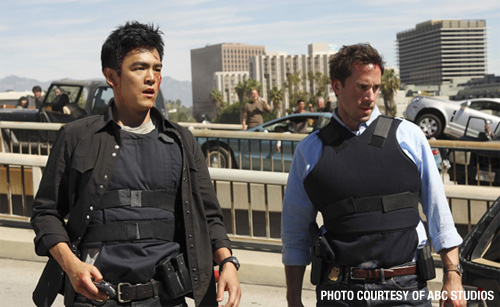 Every year since “Lost” premiered on ABC, the major networks have been scrambling to find the “next Lost.” That is, the next sprawling, mythological drama series. With the exception of “Heroes,” every attempt to breed a new show in the vein of “Lost” has failed. Enter ABC into the fray one more time with the highly anticipated adaptation of Robert Sawyer’s sci-fi novel “Flash Forward.”
Every year since “Lost” premiered on ABC, the major networks have been scrambling to find the “next Lost.” That is, the next sprawling, mythological drama series. With the exception of “Heroes,” every attempt to breed a new show in the vein of “Lost” has failed. Enter ABC into the fray one more time with the highly anticipated adaptation of Robert Sawyer’s sci-fi novel “Flash Forward.”
“FlashForward,” the show, is the story of what happens after everyone on the planet blacks out for two minutes and 17 seconds. During that time, people see a brief vision of themselves six months from now, and they all must now go on living with the knowledge of their own destiny. Fate is a common theme — yet another thing “FlashForward” so desperately tries to copy from “Lost.”
The show is aiming for a high-concept hook laced with mythology a la “Lost,” and it has quite a pedigree to do so. “,FlashForward” is written by one of the producers behind last summer’s blockbuster movie “The Dark Knight.” Its top-notch cast includes Joseph Fiennes, John Cho, and “Lost” alums Dominic Monaghan and Sonya Walger,
With these elements, “FlashForward” has the makings of a great show. Unfortunately, four episodes in, it still has some major problems, primarily with its characters.
The main focus is a team of FBI agents, including lead character Mark Benford (played by Fiennes), whose foresight showed him solving cases in what is called the “mosaic” of visions from around the world. This glimpse is his main motivation and its how the audience is to approach many of the mysteries.
Benford’s partner, Dimitri (played by John Cho), didn’t see anything in the short blackout, which he thinks is a sign of his untimely demise.
On the civilian side of things is Benford’s surgeon wife, Olivia, who saw herself with another man. Olivia’s assistant tried to commit suicide before the blackout, but now has a new outlook.
There are more bit players introduced as the show goes on, but none of names or motives are worth recalling. Even the aforementioned characters, save for Dimitri, are hard to care about.
“FlashForward” has yet to really flesh out its characters or their motivations, instead choosing to focus on playing up mysteries and driving the overarching plot forward. This is a substantial problem since relatable characters are crucial to a mystery. When guest stars trump most of the main cast, except for the one character that probably won’t make it to the season finale, there’s a problem.
If viewers just looked at the series high production values, excellent cinematography and engaging premise, “FlashForward” would be one of the best dramas in years.
But it is making the same mistake as all the other “Lost” clones, namely focusing on the mystery without giving the audience room to care about the human pieces of the puzzle.
Although it excels at turning underwhelming episodes around with stunning openings and interesting cliffhangers, “FlashForward” needs to find a way to keep the other 37 minutes of the show engaging. The show recently received a full-season order, so there may be time to move these flashes of promise forward.



















